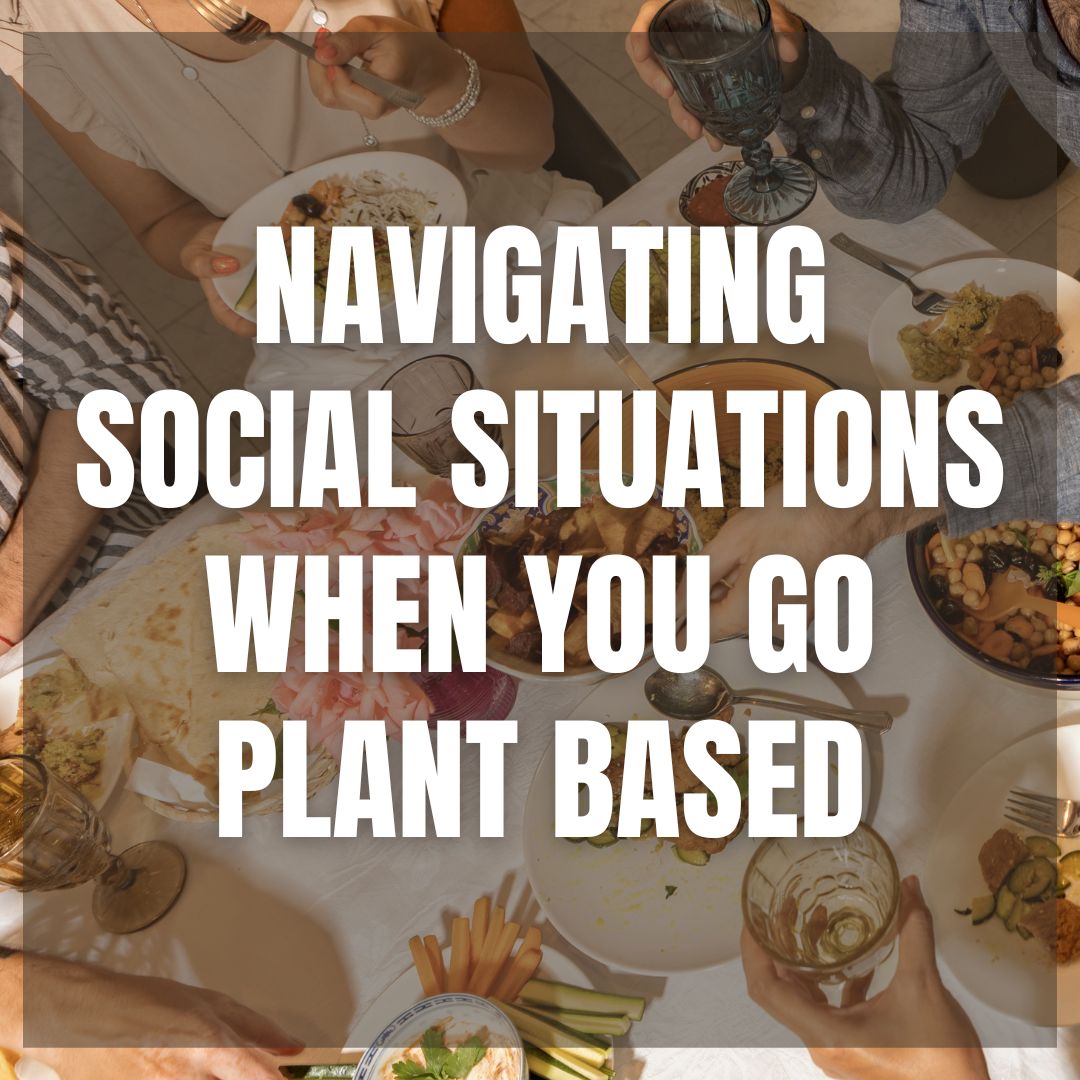You’ve embraced the vibrant world of plant-based eating. Your fridge is full of leafy greens, your taste buds are exploring new flavors, and you’re feeling energized. But then comes a common challenge – learning how to navigate social situations on a plant-based diet with friends, family, coworkers, and loved ones.
From curious questions to limited food options, social settings can feel awkward at first. The good news is that with a little preparation and the right mindset, navigating social situations on a plant-based diet can feel natural, confident, and even enjoyable.
Quick Tips for Navigating Social Situations on a Plant-Based Diet
If you’re short on time or just need reassurance, here’s the big picture:
- Focus on connection, not perfection
- Eat ahead or bring a dish when needed
- Keep responses simple and calm
- Set boundaries without over-explaining
- Give yourself permission to do what feels supportive
These small shifts make social situations feel much easier over time.
Embracing the Social Side of Plant-Based Eating
Navigating social situations on a plant-based diet isn’t just about food choices – it’s also about feeling comfortable and confident in your values. Whether you’re hosting a gathering, dining out, or attending a family event, these moments are opportunities to enjoy good company while staying aligned with how you eat.
With a little planning and flexibility, social situations don’t have to feel stressful or isolating. They can simply become part of your plant-based routine.
The Supportive Crowd
Some people will genuinely celebrate your plant-based journey. A health-focused friend might send you new recipes, or a family member may ask thoughtful questions. These are the people to lean on.
Let their support remind you that your choices don’t exist in a vacuum. You’re not alone in this, even if it sometimes feels that way.
Dealing With Skepticism and Curious Questions
Not everyone will understand your decision right away. Comments like “Where do you get your protein?” or “I could never give up cheese” are common, especially early on.
Most of the time, these comments come from curiosity or unfamiliarity, not criticism.
Helpful responses include:
“What about protein?”
Plant-based foods like lentils, tofu, chickpeas, tempeh, and beans are all excellent protein sources.
“That looks boring.”
Invite them to try your dish or share what you enjoy most about it.
A neutral option:
“It’s been working really well for me.”
You’re never obligated to educate or debate. Simple, calm responses are enough.
Setting Boundaries Without Feeling Awkward
One of the most important skills when learning how to eat plant-based in social situations is setting gentle boundaries.
You do not need to justify your choices or explain them in detail. A few simple phrases can go a long way:
- “No thank you, I’m good.”
- “That looks great, but I’ll pass.”
- “I’m eating in a way that works well for me right now.”
Setting boundaries doesn’t make you difficult. It helps protect your comfort and keeps social interactions relaxed.
Debunking Common Myths About Plant-Based Diets
You may still encounter a few common misconceptions. Having simple, grounded responses can help you feel more confident.
“Plant-based eating is expensive.”
A diet based on beans, lentils, grains, seasonal produce, and pantry staples is often very budget-friendly.
“You can’t get enough protein.”
Many plant-based foods contain protein, and most people meet their needs easily when eating a variety of whole foods.
“It’s too restrictive.”
For many people, eating plant-based actually expands their meals by introducing new cuisines, flavors, and ingredients.
Sharing calmly, without trying to convince anyone, keeps the conversation comfortable.
Dining Out With Non-Plant-Based Friends
Eating out is one of the most common social situations people worry about when transitioning to plant-based eating.
A little preparation helps:
- Look at the menu ahead of time
- Choose restaurants with flexible options
- Ask for simple swaps like olive oil instead of butter
If options feel limited, eating a small snack beforehand can take the pressure off. The goal is to enjoy time together, not stress over the menu.
What to Do When You’re Caught Off Guard
Last-minute plans happen. A spontaneous invite, a meeting with food, or an unexpected stop somewhere can feel stressful if you’re unprepared.
A few helpful strategies:
- Keep a simple snack with you
- Order something small and plant-based if available
- Focus on conversation rather than food
Being caught off guard doesn’t mean you failed. It just means you’re living your life.
Navigating Social Situations at Work
Workplace food situations can be especially tricky, from office lunches to celebrations and meetings.
Some gentle approaches:
- Eat beforehand so you’re not relying on what’s provided
- Bring a plant-based dish to share when appropriate
- Keep explanations minimal and professional
Most coworkers are focused on their own plates, not yours.
Navigating Gatherings at Someone’s Home
Potlucks, family dinners, and parties can feel uncertain when you don’t know what will be served.
Helpful strategies include:
- Offering to bring a dish everyone can enjoy
- Giving the host a friendly heads-up if needed
- Eating what works and letting the rest go
Crowd-pleasers like a hearty salad, roasted veggies, or a flavorful dip with crackers are always great options. If you want to get a bit more creative while keeping things approachable, try these delicious MEDITERRANEAN SWEET POTATOES – a dish everyone can enjoy. For something even simpler, these STORE-BOUGHT GRAB AND COOK APPETIZERS make hosting (and eating) stress-free.
Confidence Over Perfection
One of the most freeing parts of learning how to navigate social situations on a plant-based diet is letting go of perfection.
It’s okay to:
- Eat before an event
- Keep things simple
- Prioritize connection over food
Plant-based eating is a long-term lifestyle, not a performance. Confidence grows with time and experience.
Stay Patient and Flexible
Transitioning to a plant-based lifestyle is a journey, and social situations often take the longest to feel comfortable. Give yourself grace as you learn what works best for you. For a few more creative ideas for navigating social situations when you go plant-based, take a look at the Forks Over Knives article: TIPS FOR VISITING FRIENDS AND FAMILY WHO ARE NOT PLANT-BASED.
By staying prepared, setting gentle boundaries, and focusing on connection, you can confidently navigate social situations on a plant-based diet while staying true to yourself.
No. You’re not obligated to justify your choices. Simple, polite responses like “It works well for me” or “I’m good, thanks” are enough. Focus on enjoying the moment and connecting with others.
Bring a small snack, offer to contribute a dish, or eat beforehand. The goal is to participate without stress, and most hosts appreciate a heads-up about dietary preferences.
Keep your answers calm and brief. For example, you can mention plant-based protein sources, share a favorite recipe, or simply say it’s working well for you. Avoid debates unless you want to educate.
Absolutely. Focus on connection over food, bring what you enjoy, and set gentle boundaries. Social events can be fun and stress-free while staying true to your choices.






